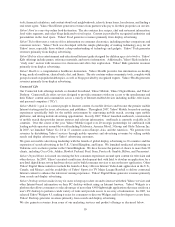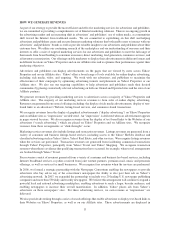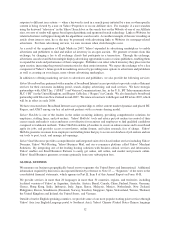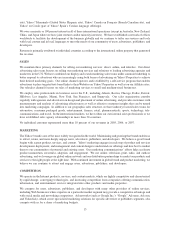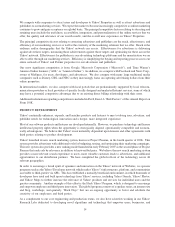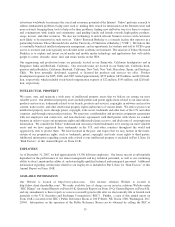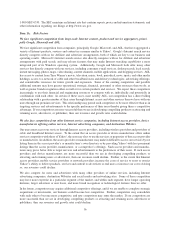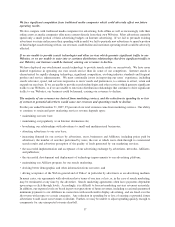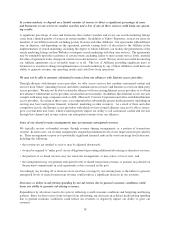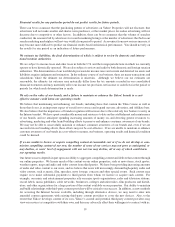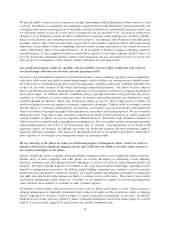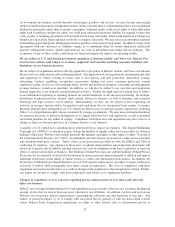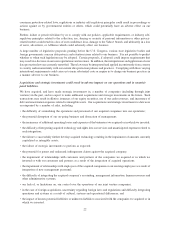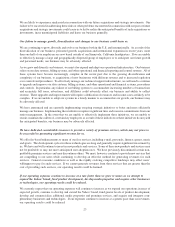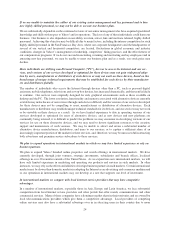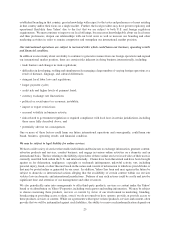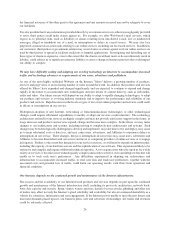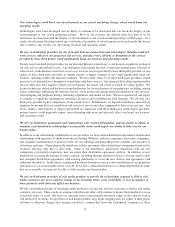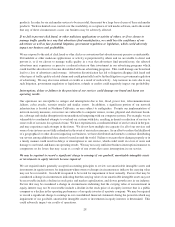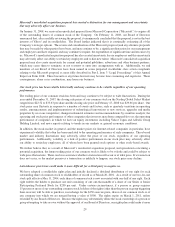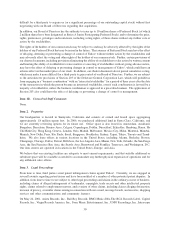Yahoo 2007 Annual Report Download - page 22
Download and view the complete annual report
Please find page 22 of the 2007 Yahoo annual report below. You can navigate through the pages in the report by either clicking on the pages listed below, or by using the keyword search tool below to find specific information within the annual report.We may be unable to enter into new, or preserve existing, relationships with the third parties whose content we seek
to obtain. In addition, as competition for compelling content increases both domestically and internationally, our
content providers may increase the prices at which they offer their content to us, and potential content providers may
not offer their content to us at all or may offer it on terms that are not agreeable to us. An increase in the prices
charged to us by third-party content providers could harm our operating results and financial condition. Further,
many of our content licenses with third parties are non-exclusive. Accordingly, other Webcasters and other media
providers, such as radio or television providers, may be able to offer similar or identical content. This increases the
importance of our ability to deliver compelling editorial content and personalization of this content for users in
order to differentiate Yahoo! from other businesses. If we are unable to license or acquire compelling content at
reasonable prices, if other companies broadcast content that is similar to or the same as that provided by Yahoo!, or
if we do not develop compelling editorial content or personalization services, the number of users of our services
may not grow as anticipated, or may decline, which could harm our operating results.
Our intellectual property rights are valuable, and any inability to protect them could reduce the value of
our brand image and harm our business and our operating results.
We create, own and maintain a wide array of intellectual property assets, including copyrights, patents, trademarks,
trade dress, trade secrets and rights to certain domain names, which we believe are among our most valuable assets.
We seek to protect our intellectual property assets through patent, copyright, trade secret, trademark and other laws
of the U.S. and other countries of the world, and through contractual provisions. The efforts we have taken to
protect our intellectual property and proprietary rights may not be sufficient or effective at stopping unauthorized
use of those rights. In addition, effective trademark, patent, copyright and trade secret protection may not be
available or cost-effective in every country in which our products and media properties are distributed or made
available through the Internet. There may be instances where we are not able to fully protect or utilize our
intellectual property assets in a manner to maximize competitive advantages. Further, while we attempt to ensure
that the quality of our brand is maintained by our licensees, our licensees may take actions that could impair the
value of our brand, our proprietary rights or the reputation of our products and media properties. We are aware that
third parties have, from time to time, misused or exploited our brands without permission or copied significant
content available on Yahoo! for use in competitive Internet services. Protection of the distinctive elements of
Yahoo! may not be available under copyright law or trademark law. If we are unable to protect our proprietary rights
from unauthorized use, the value of our brand image may be reduced. Any impairment of our brand could
negatively impact our business. In addition, protecting our intellectual property and other proprietary rights is
expensive and time consuming. Any increase in the unauthorized use of our intellectual property could make it
more expensive to do business and consequently harm our operating results.
We are, and may in the future be, subject to intellectual property infringement claims, which are costly to
defend, could result in significant damage awards, and could limit our ability to provide certain content or
use certain technologies in the future.
Internet, technology, media companies and patent holding companies often possess a significant number of patents.
Further, many of these companies and other parties are actively developing or purchasing search, indexing,
electronic commerce and other Internet-related technologies, as well as a variety of online business models and
methods. We believe that these parties will continue to take steps to protect these technologies, including, but not
limited to, seeking patent protection. In addition, patent holding companies may continue to seek to monetize
patents they have purchased or otherwise obtained. As a result, disputes regarding the ownership of technologies
and rights associated with online business are likely to continue to arise in the future. From time to time, parties
assert patent infringement claims against us. Currently, we are engaged in a number of lawsuits regarding patent
issues and have been notified of a number of other potential disputes.
In addition to patent claims, third parties have asserted, and are likely in the future to assert, claims against us
alleging infringement of copyrights, trademark rights, trade secret rights or other proprietary rights, or alleging
unfair competition or violations of privacy rights or failure to maintain confidentiality of user data. In addition,
third parties have made, and may continue to make, trademark infringement and related claims against us over the
display of search results triggered by search terms that include trademark terms.
20


